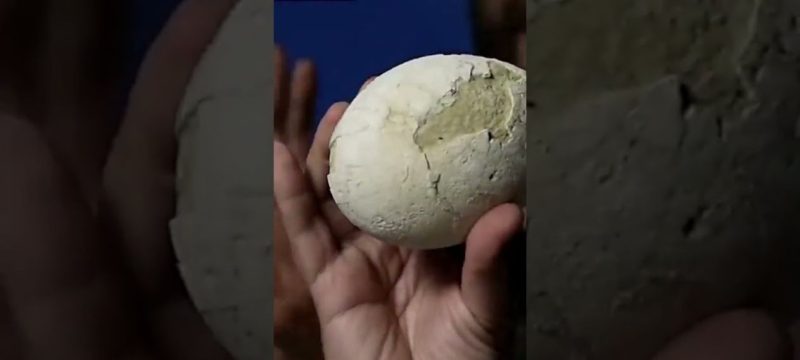ARGENTINA – Paleontologists in Argentina have made a remarkable discovery: a perfectly preserved dinosaur egg dating back over 70 million years in the fossil-rich Río Negro region.
Gonzalo Leonel Muñoz, a vertebrate paleontologist at the Bernardo Rivadavia Argentine Museum of Natural Sciences, described the finding as “spectacular.” He explained that while dinosaur fossils are common, discovering a well-preserved dinosaur egg is extremely rare.
The egg, roughly the size of an ostrich egg, likely belonged to a small carnivorous theropod called Bonapartenykus, which roamed the area during the Late Cretaceous period. Remarkably, the paleontologists also uncovered a nest, making this find even more significant.
Photos and footage shared on the Laboratory of Comparative Anatomy and Vertebrate Evolution’s Instagram page show team leader Federico Agnolín holding the egg, which appears almost intact and extremely fragile. The team emphasized that this might be the first such discovery of its type in South America.
Muñoz explained that finding eggs of carnivorous dinosaurs is unusual. Unlike sauropod eggs, which have thicker shells, carnivorous dinosaur eggs are thinner and more delicate. Being ancestors of birds, these eggs are more avian-like and prone to damage, making their preservation exceptionally rare.
The researchers plan to send the egg and other specimens to the Argentine Museum of Natural Sciences for further examination. Advanced scans will determine if an embryo is still inside, which could confirm the species and provide insights into dinosaur development and evolution.
“If the egg contains an embryo, it could reveal how carnivorous dinosaurs developed at birth and how their eggs evolved into those of birds,” said Muñoz. He added that any findings could offer new knowledge about dinosaur reproduction, growth, and the transition of certain species into avian forms.
In other news read more about Mosquitoes Found In Iceland For The First Time, Scientists Confirm
This discovery of the dinosaur egg promises to shed light on ancient ecosystems and the evolutionary history linking dinosaurs to modern birds.









